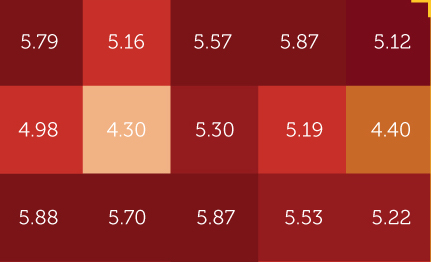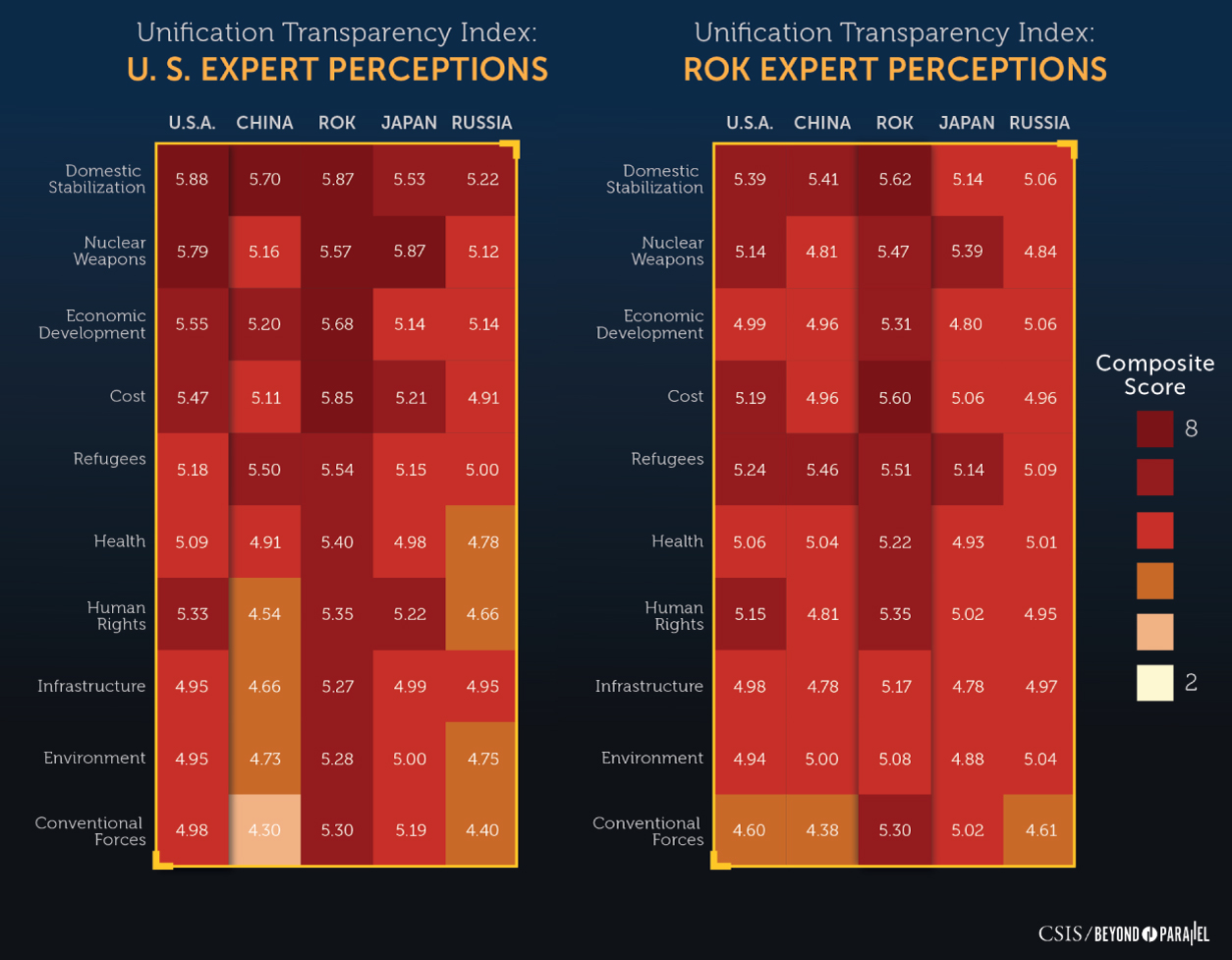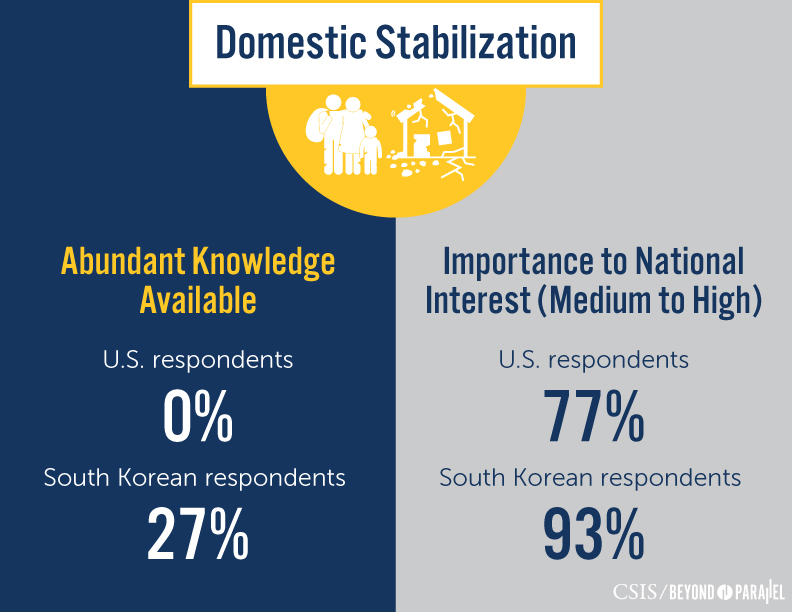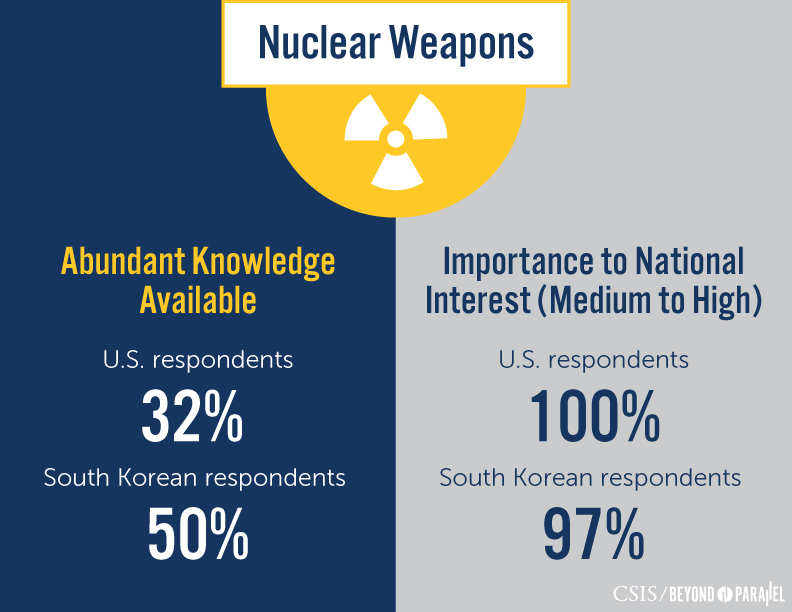
Comparing South Korea and U.S. Perceptions of Korean Unification
How Much Do We Know About Unification?
How much do the United States, South Korea, China, and other regional powers know about the long-term issues associated with Korean unification? How strongly do countries in the region perceive such issues to be important to their own national interests? Beyond Parallel has created the first-ever database of expert assessments that tries to quantify and examine the perspectives of different people from across the region on unification-related issues.
For this study, we conducted a breakthrough pilot survey with South Korean policy experts, government officials, scholars, and opinion leaders. A total of 108 South Koreans were surveyed from fall 2016 through spring 2017. The results were then cross-referenced against our original study on U.S. perspectives toward unification. This assessment allows for a comparison between U.S. and South Korean views on Korean unification and could help decisionmakers identify areas for future research and policy planning.

U.S. and South Korea Views Compared
In general, Americans feel they know less about unification issues than Koreans. 46 percent of U.S. expert responses indicated the United States had insufficient knowledge across unification-related topics, whereas 44 percent of ROK expert responses indicated South Korea had sufficient knowledge. Only 12 percent of U.S. expert responses said the United States had abundant knowledge, as opposed to 26 percent of ROK expert responses that said the same of South Korea.
Understandably, Korean respondents suggest the ROK is more concerned about unification issues than the United States. While 25 percent of U.S. expert responses said the United States had a high level of concern, 49 percent of ROK expert responses said the same of South Korea.
Nevertheless, Beyond Parallel surveys of U.S. and South Korea officials and experts reveal a general complementarity in views on unification, which speaks well to the potential for alliance coordination in planning for a unification scenario. Both allies rank domestic stabilization as their most prominent blind spot with unification and should therefore mutually assign management of this potential vulnerability a top priority.

However, there are differences in relative priorities as there is not a perfect overlap in the two countries’ blind spots. While Americans consider the disposition of nuclear weapons as their second most prominent blind spot, Koreans rank it as their fourth, behind cost and refugees. By contrast, the Americans ranked refugees further down their own need-to-do list at #6. These relative priorities may provide an opportunity for a division of labor between the allies with unification tasks.
Perceptions of Each Country’s Blind Spots
Beyond Parallel surveys suggest evidence of a basic alignment in U.S. and South Korean blind spots and policy priorities from the U.S. viewpoint. Respondents from the United States ranked the top four issues for South Korea to be 1) domestic stabilization, 2) unification cost, 3) economic development, and 4) nuclear weapons. These rankings generally align with South Korean’s ranking of themselves: 1) domestic stabilization, 2) unification cost, 3) refugees, and 4) nuclear weapons. The one caveat here is on economic development where the United States assigns a larger blind spot to South Korea, but South Koreans see it as relatively small for themselves.
However, Beyond Parallel surveys suggest that South Korean estimation of blind spots for the United States in unification does not fully align with U.S. assessments of themselves. South Korea ranks the top four blind spots for the United States in a unification scenario to be 1) domestic stabilization, 2) refugees, 3) unification cost, and 4) human rights. However, the United States ranks its priorities as 1) domestic stabilization, 2) nuclear weapons, 3) economic development, and 4) cost. The absence of nuclear weapons from the South Korean perception of U.S. blind spots might be explained by the higher level of knowledge Seoul assigns as available to the U.S. on the nuclear issue; 73 percent of South Korean experts said the United States had an abundant amount of knowledge on the issue (higher knowledge lowers the overall blind spot score). The inclusion of human rights in the South Korean top ranking of U.S. blind spot scores may reflect the increased policy attention that the U.S. executive branch and Congress have given to this issue since 2012.
While these scores do suggest general complementarity of views between the allies, they also underscore the need for more policy coordination to better hone mutual understanding of policy overlaps and gaps.
Perceiving Unification Issues’ Importance to the National Interests of the U.S. and South Korea
The blind spot score on any given unification issue represents the composite of the perceived level of concern and the perceived level of knowledge. The first half of the score, the level of concern, gauges experts’ perceptions of an issue’s importance to each country’ national interest as it relates to the Korean peninsula. The highest levels of concern were scored a 4 (vital), while the lowest levels of concern scored a 1 (no bearing at all).
Along this metric, the surveys showed some areas of contrasting views between U.S. and ROK officials and experts of what issues are vital to their national interest in a unification scenario. Overall across all unification topics, U.S. experts tended to say unification issues were “important, but not vital” or “of low importance” to U.S. national interests. In contrast, South Korean experts tended to say unification issues were of moderate to high level of importance. For instance, 74 percent of South Korean experts ranked cost as vital issue for South Korean national interest. Only 21 percent of U.S. experts said the same for U.S. national interests. Similarly, regarding the importance of conventional forces, 75 percent of ROK experts said this issues was vital to their national interest in contrast with 37 percent of U.S. experts who said the same for the United States.
File "/nas/content/staging/korea/wp-content/uploads/2016/09/Importance-National-Interest_Compared-1.xlsx" does not exist.
There is however, a close overlap in U.S. and ROK expert assessments regarding the importance of nuclear weapons to both countries national interests. 85 percent of ROK experts said the ROK views this issue as vital to their national interest. 93 percent of U.S. experts said the same for the U.S.
Another particular area that showed a general alignment of views was human rights and transitional justice. 78 percent of ROK experts said human rights and transitional justice was of moderate to high concern for South Korea. 74 percent of U.S. experts said the same of the United States.
There was not a large gap between the United States and ROK on issues deemed of low importance to national interests. More than half of U.S. experts said infrastructure (52 percent), health (55 percent), and the environment (55 percent) were of low importance to U.S. national interests. These same issues received the largest low importance responses from ROK experts for South Korea (between 27–41 percent).
Assessing Unification Knowledge Gaps: Availability of Empirical Evidence in the U.S. and South Korea
The second half of the blind spot scores is composed of expert’s perceptions of knowledge defined as the amount of empirical evidence, intelligence, analysis, and scholarly literature available to each country on which to base policy decisions. The worst levels of knowledge were scored a 4 (no amount), while the best levels were scored a 1 (abundant amount).
The perceived levels of knowledge in the U.S. and South Korea surveys reveal the need for greater dialogue between the allies over what the two think that they know about unification.
U.S. officials and experts feel they have the lowest level of knowledge about unification costs: 75 percent said there was not a sufficient amount of knowledge available. In direct contrast, 75 percent of South Korean said South Korea has at least a sufficient amount of knowledge on this topic. Domestic stabilization (31 percent U.S. versus 75 percent South Korean) and economic rehabilitation (30 percent U.S. and 79 percent South Korean) show a similar pattern. There are also knowledge gaps between the two allies on unification costs, human rights/transitional justice, and refugees. Americans feel they know less about all three issues than Koreans. Koreans feel they know more about unification costs and refugees than Americans, but less about human rights/transitional justice. This suggests an incentive for burden sharing and division of labor, but it also highlights the need for greater information sharing between the two allies on these issues in advance of unification.

However, the United States and South Korea both believe they have relatively high levels of empirical knowledge about the disposition of nuclear weapons in a unification scenario; 83 percent of U.S. experts assume the United States has at least a sufficient amount of knowledge on the issue, and 85 percent of South Koreans assume South Korea does as well. Likewise, the U.S. and South Korean experts assumed high levels of knowledge in regard to conventional forces; 86 percent of the U.S. experts assumed the United States has at least a sufficient amount of knowledge on the issue, while 91 percent of South Koreans assume the same for South Korea.
File "/nas/content/staging/korea/wp-content/uploads/2016/09/Level-of-Knowledge_Compared.xlsx" does not exist.
How to Understand the Index?
In the Unification Transparency Index, blind spots are a composite measure based on two variables from the Beyond Parallel pilot survey of experts and policymakers. The first variable assessed is the relative level of importance for a unification-related topic to the national interests of the United States, Japan, South Korea, China, and Russia as it relates to the Korean peninsula. The highest levels were scored a 4 (vital to national interests). Responses that indicated an issue was “of importance, but not vital” to national interests scored a 3, “of low importance” scored a 2, and the lowest levels scored a 1 (no bearing at all). The second variable assessed the amount of knowledge, which is defined as empirical evidence, analysis, and scholarly literature each country has on the issues on which to base their policy decisions. Here the highest levels of knowledge were scored a 1 (abundant empirical evidence). Responses that indicated there was a “sufficient amount” of empirical evidence scored a 2, “insufficient amount” scored a 3, and the lowest levels of knowledge were scored a 4 (no empirical evidence).
The results from these two variables were averaged and then combined to produce a composite measure of blind spots for each country on the 10 selected unification issues. The higher the score, the deeper the shade of red in the Index, and the larger the blind spot is for that issue.
The largest blind spots are at the nexus of a complete lack of empirical evidence and yet are seen as vital to national interests.
The unification issues with the largest blind spots are those at the nexus of a complete lack of empirical evidence (4) and vital to national interests (4)—a recipe for potential disaster. On the other end of the spectrum, the smallest blind spots result from issues with no bearing on national interests (1) but with abundant empirical evidence (1). The initial findings from the Index will help set the research agenda as Beyond Parallel seeks to build greater knowledge and increase available empirical evidence in each of these critical issues.
This unique Beyond Parallel data set will eventually be expanded to include—in addition to U.S. and South Korean expert perceptions—survey results of experts, officials, scholars, and opinion leaders from all five countries in the Index to offer a comprehensive assessment of what we do and do not know about unification.
